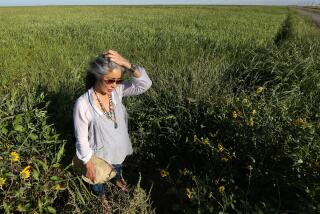Produce Patron Promotes Status Crops
- Share via
OAKLAND — Sibella Kraus is an eager booster of small specialty farms, the people who run them and the people who eat their produce.
“I equate specialty with high quality,” she explained during the National Direct Marketing Conference and Farm Conference 1989 at the Oakland Convention Center.
“I lay out a simplistic formula: specialty, quality, care, knowledge, resources,” said Kraus, who founded the “Tasting of Summer Produce” event held at the Oakland Museum for the past two years.
She contended that people who are interested in specialty crops are “highly discriminating consumers or consumers who want to be educated.”
Packaging Is Crucial
A specialty grower, in her eyes, maintains close, careful control from planting through harvest, packing and marketing to assure a top quality crop.
“With every specialty farmer I talk to, the labor is an integral part of that quality,” she stressed. “The care involves everyone on the farm.”
She cited Pettigrew Fruit Co. of Walnut Grove, where sister and brother operators Sally Small and Rob Moser actively encourage teamwork and cooperation among their workers and “pay people as a team.”
A specialty of their farm is a variety of pears called French butter, which they wrap in tissue to make more attractive to customers.
“The pack is always important; you’ve got to get the crop to market in great shape,” Kraus advised.
Paying constant attention to the product also is the rule of Tom and Denese Willey, who grow organic vegetables on leased land near Fresno. They personally inspect every box, Kraus said, to back up their labels that proclaim “naturally good and good naturally.”
The Willeys, who started their farm with a $10,000 investment, “avoid debt and maximize their own labor,” she said.
They try innovative methods such as using shredded unprinted newsprint for mulch on beans. A neighbor taught them principles of crop rotation to increase soil fertility.
To keep expenses down, the Willeys buy used equipment.
“They are not hooked into extremely expensive machinery that hooks some farmers into the same crop every year because it has to be paid off,” Kraus said.
She said part of the success of growing specialty crops is “how the sequence of crops works into the life style of that family.”
One farmer “does cut flowers, then potatoes, is out of potatoes by mid-May, then has stone fruit near the end of the season,” Kraus said.
“The key is to focus on quality--grow what you believe in,” she concluded. “Being a specialty grower is being the very best at what you do. Being a good specialty grower takes knowledge, artfulness and clearly a healthy respect for Mother Nature.”
More to Read
Inside the business of entertainment
The Wide Shot brings you news, analysis and insights on everything from streaming wars to production — and what it all means for the future.
You may occasionally receive promotional content from the Los Angeles Times.










